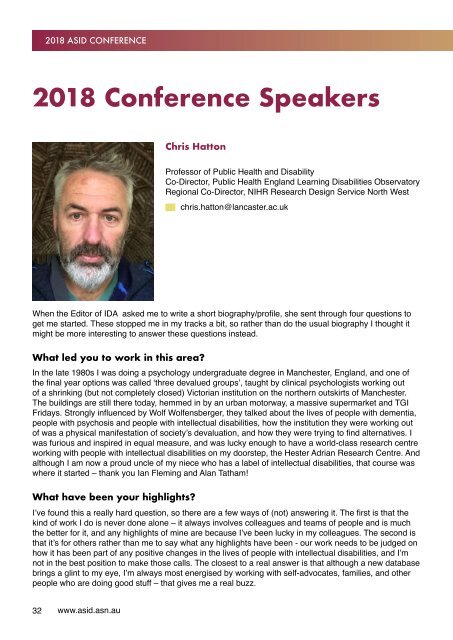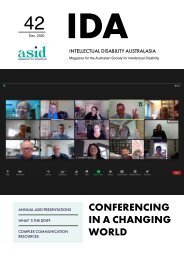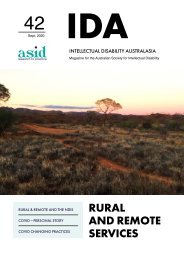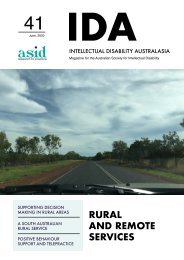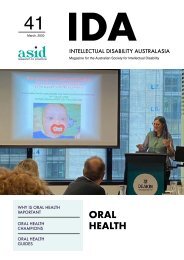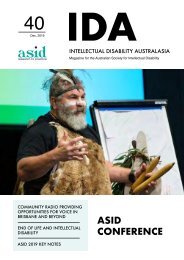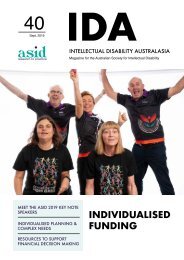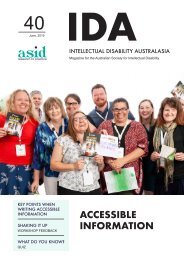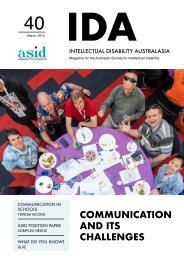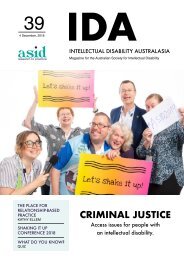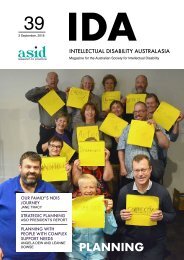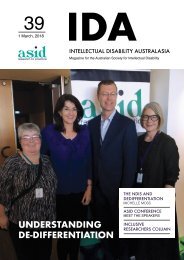You also want an ePaper? Increase the reach of your titles
YUMPU automatically turns print PDFs into web optimized ePapers that Google loves.
<strong>2018</strong> ASID CONFERENCE<br />
<strong>2018</strong> Conference Speakers<br />
Chris Hatton<br />
Professor of Public Health and Disability<br />
Co-Director, Public Health England Learning Disabilities Observatory<br />
Regional Co-Director, NIHR Research Design Service North West<br />
chris.hatton@lancaster.ac.uk<br />
When the Editor of <strong>IDA</strong> asked me to write a short biography/profile, she sent through four questions to<br />
get me started. These stopped me in my tracks a bit, so rather than do the usual biography I thought it<br />
might be more interesting to answer these questions instead.<br />
What led you to work in this area?<br />
In the late 1980s I was doing a psychology undergraduate degree in Manchester, England, and one of<br />
the final year options was called ‘three devalued groups’, taught by clinical psychologists working out<br />
of a shrinking (but not completely closed) Victorian institution on the northern outskirts of Manchester.<br />
The buildings are still there today, hemmed in by an urban motorway, a massive supermarket and TGI<br />
Fridays. Strongly influenced by Wolf Wolfensberger, they talked about the lives of people with dementia,<br />
people with psychosis and people with intellectual disabilities, how the institution they were working out<br />
of was a physical manifestation of society’s devaluation, and how they were trying to find alternatives. I<br />
was furious and inspired in equal measure, and was lucky enough to have a world-class research centre<br />
working with people with intellectual disabilities on my doorstep, the Hester Adrian Research Centre. And<br />
although I am now a proud uncle of my niece who has a label of intellectual disabilities, that course was<br />
where it started – thank you Ian Fleming and Alan Tatham!<br />
What have been your highlights?<br />
I’ve found this a really hard question, so there are a few ways of (not) answering it. The first is that the<br />
kind of work I do is never done alone – it always involves colleagues and teams of people and is much<br />
the better for it, and any highlights of mine are because I’ve been lucky in my colleagues. The second is<br />
that it’s for others rather than me to say what any highlights have been - our work needs to be judged on<br />
how it has been part of any positive changes in the lives of people with intellectual disabilities, and I’m<br />
not in the best position to make those calls. The closest to a real answer is that although a new database<br />
brings a glint to my eye, I’m always most energised by working with self-advocates, families, and other<br />
people who are doing good stuff – that gives me a real buzz.<br />
32 www.asid.asn.au


